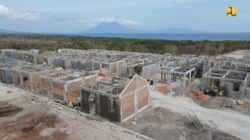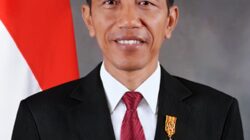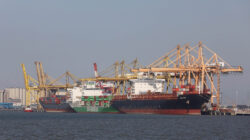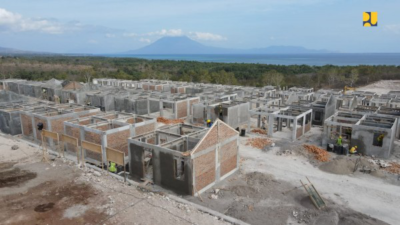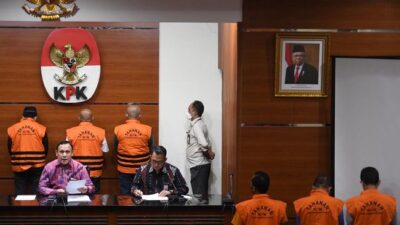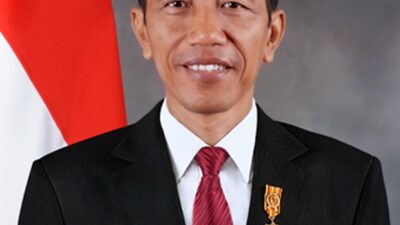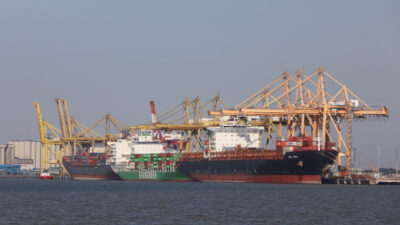IndoNEWSian.com – Given that the present US$7.3 billion railway project isn’t expected to become profitable for four decades, experts are advising prudence regarding any expansion plans.
Indonesia is reconsidering plans to expand its Chinese-supported high-speed rail network, aiming to link Jakarta with Surabaya, the country’s second-biggest city. However, experts suggest common challenges might impede the initiative, including regulatory obstacles and increasing debts owed to China.
The suggested addition would expand upon Whoosh – The inaugural run of Southeast Asia’s initial high-speed rail link—a $7.3 billion endeavor spanning from Indonesia’s capital, Jakarta, to Bandung in West Java—was marked by significant challenges including postponements and budget overshoots. This 142-kilometer (88-mile) track, primarily financed by Chinese investors, was ceremonially opened under the tenure of the previous Indonesian president. Joko Widodo in October 2023.
Discussions about expanding the high-speed rail line eastward toward Surabaya have been ongoing even prior to Whoosh starting its operations. These proposals were primarily advocated for by Luhut Binsar Pandjaitan, who served as Widodo’s longstanding advisor and held the position of coordinating minister for maritime affairs and investment during his tenure.
Are you curious about the most significant issues and global trends? Find out here. SCMP Knowledge
Our latest platform offers carefully selected content including explainers, FAQs, analyses, and infographics, all provided by our acclaimed team.
Currently serving as the head of the National Economic Council, an advisory group for the government, Luhut confirmed during his visit to Beijing from May 20-22 that the expansion of the railway was still under consideration. However, he admitted that the project has been held up due to bureaucratic hurdles within Indonesia.
“The problem lies with us since we have not completed the drafting of the regulation as of now. It’s quite straightforward. However, upon completion, we will proceed to discuss a potential joint study [with China],” Luhut stated to Indonesia’s state-run Antara news agency.
The presidential decree needs to be released promptly as China is awaiting confirmation; once approved, the collaborative research can proceed.
His comments came after a meeting with China’s Foreign Minister. Wang Yi. Luhut’s trip to Beijing occurred just days prior to the visit of China’s Premier. Li Qiang His visit to Jakarta, which was part of his inaugural international journey this year, included meetings with the President. Prabowo Subianto
. Each side expressed interest in expanding trade and investment relationships despite the present challenges in the global economy.
China stands as Indonesia’s top trading partner, with their yearly two-way trade surpassing $130 billion, as mentioned by Prabowo at the meeting. Strengthening relations with Southeast Asia’s biggest economy has grown more significant for Beijing as it manages its current challenges. trade war with the United States.
Analysts argue that extending the high-speed rail network to Surabaya would symbolize stronger relationships, further supporting China’s key Belt and Road initiative designed to boost regional interconnectivity.
However, any progress would necessitate Indonesia tackling the issues faced with Whoosh, particularly the danger of extended financial liabilities to China against a backdrop of unclear economic circumstances.
According to Siwage Dharma Negara, a senior fellow and co-coordinator for the Indonesia studies program at Singapore’s ISEAS – Yusof Ishak Institute, “From my perspective, the project cannot proceed right now due to the stringent financial constraints currently affecting the government.”
Dedi Dinarto, a senior associate and chief Indonesia analyst at the strategic advisory firm Global Counsel, stated that lessons ought to have been gleaned from the previous Jakarta-Bandung railway initiative.
He stated that this time around, Indonesia needs to meticulously evaluate the entire project cost for land procurement, construction hazards, and possible budget escalations, as these factors significantly impacted the Jakarta-Bandung initiative.
Financial burdens
The construction of Whoosh started in 2016, with plans for initial operations set to commence in 2019. Nevertheless, the project faced delays due to issues related to acquiring land, environmental worries, and the outbreak of the Covid-19 pandemic.
Initially estimated at 66.7 trillion rupiah ($4 billion), the overall expenses surged to 113 trillion rupiah. The China Development Bank financed 75% of this amount, while the remaining portion was supported by Indonesia’s state budget—contrary to previous statements that public funds wouldn’t be utilized, as noted by Muhammad Zulfikar Rakhmat from the Centre for Economic and Law Studies in Jakarta.
The Chinese loan features a 40-year repayment schedule along with a 10-year grace period; however, further borrowing might be necessary to handle increasing debts. According to Zulfikar, records from Indonesia’s state railway firm indicated that the initiative incurred a shortfall of 3.15 trillion rupiah ($193 million) during its initial operational year.
The railway’s internal rate of return stood at 8.56 percent, which falls short of the required threshold of 10 percent, according to a recent operational analysis shared by him. Additionally, the project isn’t expected to become profitable for another forty years, casting significant doubt on its economic feasibility.
These numbers indicate that the initiative might not become financially independent in the near to mid-term future, which would require ongoing governmental assistance for managing debt repayments and covering operating expenses, according to Zulfikar.
In his address in Beijing, Luhut admitted to errors made during the construction of the Jakarta-Bandung railway. He stated, “Our intention is not to assign blame to anyone; instead, we aim to learn from these oversights since I was also part of this process.”
In the meantime, Transportation Minister Dudy Purwagandhi emphasized that any expansion of Surabaya’s transportation system should not impose an additional financial load on the national budget. He mentioned that the government was considering various options—such as implementing slower train services—to align with market demands and assess their economic viability.
Reliance on China
The joint venture responsible for Whoosh, Kereta Cepat Indonesia China, announced last month that the railway had transported 9.2 million passengers since its inauguration. On May 3rd, they stated that a peak of 25,316 travelers were recorded using the service — suggesting significant public enthusiasm.
Boosting passenger numbers will be essential for recouping investments, and expanding the service to include Surabaya—a significant commercial hub and seaport—could draw additional riders.
Dedi from Global Counsel suggested that a collaboration between public and private sectors might enhance the feasibility of the expansion, as private investors may be more willing to take on the risks associated with the initiative.
He stated that the corridor connects two major business hubs, potentially attracting a higher volume of passengers, thus making the investment more justifiable compared to the Jakarta-Bandung project.
Given Prabowo’s emphasis on key social initiatives such as complimentary school lunches and expected increases in governmental expenditures in the future, the Ministry of Finance is probably not inclined to back extra sovereign debt for this initiative.
Should Indonesia proceed with Chinese investment, analysts caution that it may deepen concerns about the country’s growing reliance on Beijing for large-scale infrastructure.
“While Chinese investments have facilitated rapid development, they have also led to apprehensions about debt sustainability and national sovereignty,” said Zulfikar, further citing criticisms about
Belt and Road Initiative
lack of openness in projects along with their effect on the environment.
He suggested that to address these issues, Indonesia ought to explore various investment opportunities from different countries and ensure that deals with international parties are equitable while protecting the nation’s interests.
More Articles from SCMP
Why China’s intense competitive landscape requires global focus
John Lee from Hong Kong meets new liaison office head, pledges to seek new development opportunities
Private companies in Hong Kong are heading in the correct path.
Dark particles detected in water? Hong Kong confirms safety of supplies at public housing complex
The article initially appeared on the South China Morning Post (www.scmp.com), which serves as the premier source for news coverage of China and Asia.
Copyright © 2025. South China Morning Post Publishers Ltd. All rights reserved.


